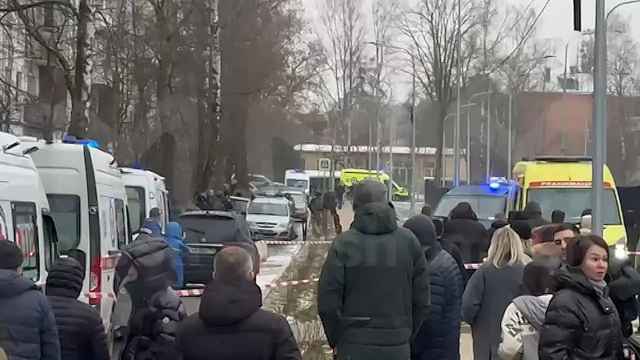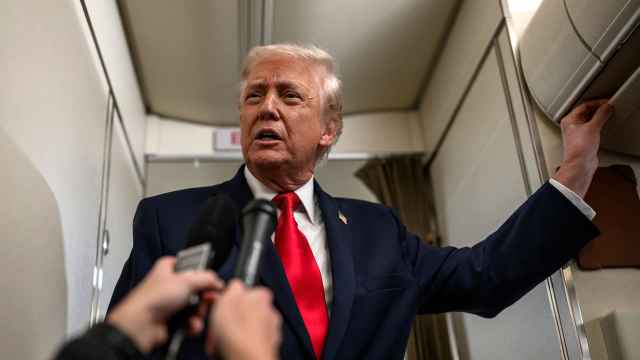Natalya Veselova has spent more than a year trying to get a Russian driver’s license.
What should have been a simple process has turned into a frustrating ordeal. The apparent reason? She refuses to bribe the Moscow police officers who administer the exam.
“They are doing their best to push people to pay bribes for licenses,” said Veselova, the 33-year-old mother of a toddler, who has now failed the driving test seven times. Many others in her position give in and pay the bribe, typically the equivalent of several hundred dollars.
Since Vladimir Putin came to power in 2000, corruption has penetrated deep into the fabric of everyday life. Ordinary people find themselves giving money to police officers as well as doctors, teachers and government officials just for basic public services. Resentment over this pervasive graft has fueled the protest movement against Putin as he seeks to regain the presidency in the March 4 election.
Half of Moscow residents and nearly 40 percent of all Russians have been in a situation where they felt a bribe was necessary to solve problems, according to research conducted last year by the Public Opinion Foundation and the Indem Foundation, which studies corruption.
“Citizens are not actually rushing to pay bribes,” said Yelena Panfilova, director of Transparency International in Russia. “They pay when they’re being cornered into a situation where they have no choice.”
Many of the bribes go to the traffic police, who administer the driving exams.
Veselova began taking driving lessons in January 2011, hoping that by the summer she would be able to run errands with her young daughter in the backseat. In May, she was applied for her license, passed the written exam, but then failed the road test.
She returned to the station, a commute of an hour and a half each way, to retake the exam six times. Each time, police officers found some fault with her driving. With Russia’s driving code filled with an array of arcane regulations, officers use a variety of excuses to flunk an applicant.
“If an examiner doesn’t like you, it’s very easy for him to fail you,” said Sergei Kanayev, chairman of the Moscow-based Federation of Car Owners.
Veteran driving instructors say applicants are routinely failed over technicalities and that many of their students end up paying despite being competent drivers. In most cases, police officers don’t have to ask explicitly for a bribe. Their behavior during the test and advice to “come better prepared” are universally taken as a hint that money will have to be paid.
Kanayev estimates that 50 percent of Russians who fail the driving test end up paying a bribe to get their license. No figures are available largely because of the reluctance of people to admit to having bribed the police.
The traffic police failed to respond to requests for comment over a period of several weeks. Interior Minister Rashid Nurgaliyev last year lauded some regional police officials for eradicating corruption, but acknowledged that it remains a problem in most regions.
Newspapers are full of reports of policemen arrested on charges of corruption. Last year, the head of the exams department and five other employees of a police station in Moscow were fired for “issuing driver’s licenses for bribes.”
Veselova’s family and friends have been trying to persuade her to stop wasting time and pay the bribe.
Finding someone to “arrange” a license isn’t difficult. Many drivers are happy to pass on the contacts of an intermediary who will make such arrangements, and thus spare the candidate from directly bribing the police officer. The service typically costs from 10,000 to 15,000 rubles ($330 to $500).
Veselova said a friend offered to arrange for her to pass in exchange for two bottles of cognac, but she couldn’t bring herself to do it.
“I’m a believer in God. And this would mean deception,” Veselova said. “I’m raising a child. How would I then tell her that she must always be honest and act honestly?”
After failing to pass the driving test within three months, Veselova had to start the process over again. She recently resumed the effort and has again passed the written exam and the parking test.
With the driving test still ahead, she is more determined than ever not to pay.
“They got me so angry,” Veselova said. “We pay our taxes, so why do I have to go and bow down to them?”
A Message from The Moscow Times:
Dear readers,
We are facing unprecedented challenges. Russia's Prosecutor General's Office has designated The Moscow Times as an "undesirable" organization, criminalizing our work and putting our staff at risk of prosecution. This follows our earlier unjust labeling as a "foreign agent."
These actions are direct attempts to silence independent journalism in Russia. The authorities claim our work "discredits the decisions of the Russian leadership." We see things differently: we strive to provide accurate, unbiased reporting on Russia.
We, the journalists of The Moscow Times, refuse to be silenced. But to continue our work, we need your help.
Your support, no matter how small, makes a world of difference. If you can, please support us monthly starting from just $2. It's quick to set up, and every contribution makes a significant impact.
By supporting The Moscow Times, you're defending open, independent journalism in the face of repression. Thank you for standing with us.
Remind me later.





